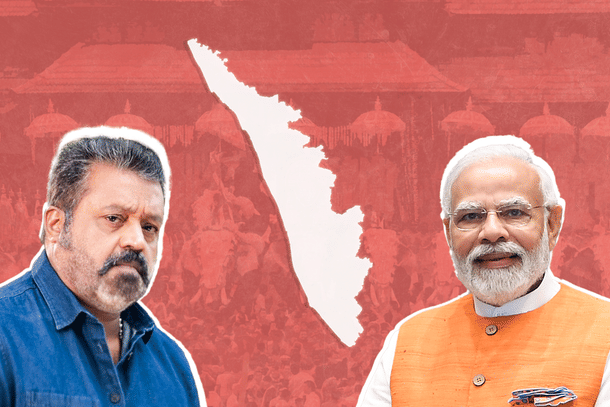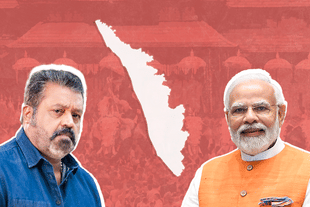Politics
What The 2024 Results Mean For BJP In Kerala
Ananth Krishna
Jun 09, 2024, 02:05 PM | Updated 11:21 PM IST
Save & read from anywhere!
Bookmark stories for easy access on any device or the Swarajya app.


The 2024 general election results have given a lot of headache for Bharatiya Janata Party (BJP), but among the many upsides that it can see in this election is the historic result in Kerala.
For the first time ever, the BJP has won a seat in the Lok Sabha elections from the state in Thrissur.
Though it did not breach 20 per cent vote share in the state, it has made serious gains in vote share across the state, reaching 19.39 per cent from 15.54 per cent in 2019.
BJP also came astonishingly close to winning in both Attingal and Thiruvananthapuram — finishing about 16,000 votes less than the winner.
The BJP would hope to maintain these gains as the party and the National Democratic Alliance (NDA) head into the 2026 assembly elections in Kerala.
More remarkable than the gains that the BJP has made is that the Communist Party of India-Marxist's or CPI-M's and the Left Democratic Front's (LDF’s) vote share has fallen to 33 per cent. Coming on the heels of a record victory in the 2021 assembly elections, the anti-incumbency against the LDF seems to have breached new records.
This, combined with United Democratic Front (UDF) sweeping Kerala may portend a victory for them in 2026 assembly elections. Then again, this was the expectation after the wipeout in 2019 as well.
Explaining The Results
As Venu Gopal Narayanan of Swarajya noted in his piece, the consolidation in favour of the Congress has been effective in 2024 just like in 2019. Minority votes have consolidated massively in favour of the Congress, regardless of the impression of Rahul Gandhi becoming prime minister in the run-up to the elections.
The CPI-M has continued to have a terrible performance in the Lok Sabha elections, by leading in only 19 assembly constituencies and winning only one parliamentary seat — Alathur.
The BJP led in a record 11 constituencies and finished second in another nine constituencies, compared to leading only one (Nemom) in 2019. The NDA raised its vote share in every constituency except for Pathanamthitta and Malappuram.
The massive gains that the NDA has made are in Thrissur, Alappuzha and Alathur. And as noted earlier, it came close to winning in Attingal (16,272 votes from winner) and in Thiruvananthapuram (about 16,077 votes).
All of these are positive signs, and indicate the supposed untouchability of the BJP among Malayali voters is illusory at best.
What BJP Can Learn From 2024 Results in Kerala
The historic victory of Suresh Gopi in Thrissur has a lot of lessons for the BJP. The film actor who became a nominated member of the Rajya Sabha in 2016, had contested in Thrissur parliamentary constituency in 2019 and in the Thrissur city assembly constituency in 2021.
What made the entire difference in his victory — which by a margin of 74,000 votes is impressive in itself — is that he worked within the constituency consistently in the past five years. His charismatic and deft handling of the media was a huge plus, but his public presence in the constituency made a substantial difference.
Similarly, the gains made by V Muraleedharan in Attingal, is nothing to scoff at. He might have finished third, but the difference between him and the winner is a mere 16,000 votes. He too had made Attingal the centre of his activities, and definitely rode on the anti-incumbency against the sitting MP Adoor Prakash (Congress) and the state government.
If the CPI-M had not fielded as strong a candidate as V Joy (who is also the CPI-M district secretary), it is likely that Muraleedharan may have made the cut this time around. In Thiruvananthapuram, Rajeev Chandrashekhar’s commitment to continue in the constituency would also pay dividends in the future.
Moving forward, the BJP should ideally allow such senior leaders to focus on a single constituency, as the availability in the public sphere has paid dividends.
Considering that the BJP has only recently started to come as a political alternative to the LDF and UDF in the politically charged state, the availability of leaders and their presence in public fora will make a significant difference to people's perception about the BJP.
The other major gains made by the BJP were in Alathur and Alappuzha, where Dr T N Sarasu and Shobha Surendran put on brilliant campaigns that attracted public attention.
Shobha Surendran, especially, made Alappuzha a three cornered race, garnering 299,648 votes (28.3 per cent) of the votes. This opens the door for Alappuzha to be another constituency where the BJP is actively in the reckoning.
Shobha Surendran, who has the image of a firebrand leader, has significant public sympathy and support, and can mount a serious challenge for the constituency in 2029, and even possibly fight the Assembly elections from Haripad or Kayamkulam assembly constituencies where she finished second behind Congress.
Alathur is more of an interesting case study where a maverick candidate — Dr T N Sarasu has made a significant difference. She captured a respectable 18.97 per cent of the votes (around 1.9 lakh votes), where the NDA had previously less than 10 per cent of the votes.
That she was a BJP candidate in the constituency did make some difference, but it was likely her public stance on the Karuvannur bank issue and her charisma that were also pivotal.
She would be the right candidate for the upcoming Chelakkara assembly by-poll (Chelakkara is in Alathur parliamentary constituency and was the sitting seat of K Radhakrishnan of CPI-M who won the election in Alathur).
Another important facet of these elections was the BJP in Kerala attacked both the UDF and LDF on the front foot. The BJP and NDA had generally focussed on attacking the CPI-M and LDF in the past, but this time around the BJP was unsparing of their criticism of UDF.
This, combined with the historic anti-incumbency has led to a good amount of CPI-M-aligned votes, even in Malabar, polling for the BJP.
The Future For BJP
There are likely to be three by-polls upcoming in Kerala: two assembly constituencies (Palakkad and Chelakkara) and one parliamentary constituency (Wayanad) Palakkad, whose sitting MP Shafi Parambil won in Vadakara, had defeated E Sreedharan (BJP) by a narrow margin about 3,859 votes) in 2021.
Palakkad Assembly bypoll is the only one where the BJP has an outside chance of victory, but the BJP historically has not performed well in by-polls in Kerala. A lot then would depend on the candidate selection in the constituency, with the Congress likely to field Youth Congress state president Rahul Mankootathil.
Chelakkara assembly had seen K Radhakrishnan (CPI-M) win by a massive 39,000 vote margin in 2021. The BJP candidate had then polled around 24,000 votes, and even in these elections Dr Sarasu secured only about 29,000 votes in the constituency. Considering the historical weakness in bypolls, securing even 25,000 votes would be quite an achievement for the BJP in Chelakkara.
Wayanad meanwhile, witnessed K Surendran make gains of up to 13 per cent vote share (contrasted to a mere 7.25 per cent last time). It would be a good performance if the BJP candidate is able to reach 10 per cent of vote share in the bypoll, assuming Rahul Gandhi vacates the seat in favour of Rae Bareli.
In an earlier piece (“What the Future Holds for the BJP in Kerala”) I had noted that the future of BJP depends on gaining the votes of CPI-M-aligned Hindus and Christians in the state.
It is not a universal phenomenon in the state yet, but the BJP has polled Christian votes in good numbers in Thrissur, and a good amount of CPI-M-aligned votes in Alappuzha, Attingal and broadly in Malabar.
These are exceedingly positive signs for the BJP that experienced a decline in vote share in the 2021 assembly election and struck out without winning even a single seat.
 (2).png?w=610&q=75&compress=true&format=auto)
The 2024 general election results may have created significant headaches for the BJP to introspect in Uttar Pradesh and rest of north India, but the signs in Kerala are more than encouraging for the party. The party should ideally keep at its pace in Kerala, with an eye on the 2025 local body polls and the 2026 assembly elections.
Ananth Krishna is a lawyer and observer of Kerala's politics.





